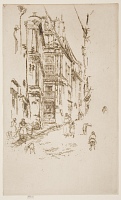Chancellerie, Loches | ||
| Number: | 411 | |
| Date: | 1888 | |
| Medium: | etching | |
| Size: | 271 x 166 mm | |
| Signed: | butterfly at right | |
| Inscribed: | no | |
| Set/Publication: | no | |
| No. of States: | 7 | |
| Known impressions: | 14 | |
| Catalogues: | K.383; M.383 | |
| Impressions taken from this plate (14) | ||
TECHNIQUE
This plate was executed completely in etching. The windows appear to have especially concerned Whistler, and he returned again and again to the problems of conveying reflections and glimpses of the interior, repeatedly removing and re-etching lines in those areas. In the final state, it appears that new lines were bitten by applying acid without an etching ground, as the pattern of foul biting indicates that a large puddle of acid was in direct contact with the copper plate.
PRINTING
Whistler's labelling was a bit erratic, but he seems to have considered that he had printed three impressions of the first state. One impression is inscribed '1st. State / only proof ' and printed in dark brown ink on ivory laid paper with a Pro Patria watermark ( ). Two are inscribed '1st. State - / only three proofs printed' and one of these was printed in dark brown ink on cream laid paper (
). Two are inscribed '1st. State - / only three proofs printed' and one of these was printed in dark brown ink on cream laid paper ( ). The other is actually the second state and is in black ink on ivory - now buff - laid paper with an Arms of Amsterdam watermark (
). The other is actually the second state and is in black ink on ivory - now buff - laid paper with an Arms of Amsterdam watermark ( ).
).
 ). Two are inscribed '1st. State - / only three proofs printed' and one of these was printed in dark brown ink on cream laid paper (
). Two are inscribed '1st. State - / only three proofs printed' and one of these was printed in dark brown ink on cream laid paper ( ). The other is actually the second state and is in black ink on ivory - now buff - laid paper with an Arms of Amsterdam watermark (
). The other is actually the second state and is in black ink on ivory - now buff - laid paper with an Arms of Amsterdam watermark ( ).
).These were followed with variations in inking and paper, Whistler apparently switching between black and brown ink as he made tiny changes in the states. Examples include a second state in dark brown ink on ivory 'antique' (pre-1800) laid paper with a horned crown watermark ( ); a third state in black ink on ivory laid paper (
); a third state in black ink on ivory laid paper ( ); fourth states in black ink on ivory 'antique' watermarked laid (
); fourth states in black ink on ivory 'antique' watermarked laid ( ) and dark brown on ivory laid paper (
) and dark brown on ivory laid paper ( ); followed by fifth states in dark brown ink on cream laid Arms of Amsterdam paper (
); followed by fifth states in dark brown ink on cream laid Arms of Amsterdam paper ( ) and on ivory laid paper (
) and on ivory laid paper ( ).
).
 ); a third state in black ink on ivory laid paper (
); a third state in black ink on ivory laid paper ( ); fourth states in black ink on ivory 'antique' watermarked laid (
); fourth states in black ink on ivory 'antique' watermarked laid ( ) and dark brown on ivory laid paper (
) and dark brown on ivory laid paper ( ); followed by fifth states in dark brown ink on cream laid Arms of Amsterdam paper (
); followed by fifth states in dark brown ink on cream laid Arms of Amsterdam paper ( ) and on ivory laid paper (
) and on ivory laid paper ( ).
).
